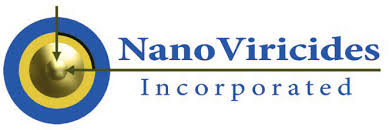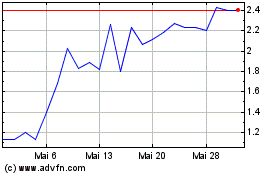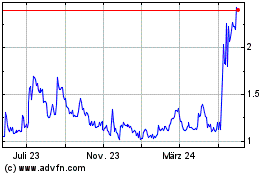
SHELTON, CT -- May 2, 2024 -- InvestorsHub NewsWire
-- NanoViricides, Inc. (NYSE Amer: NNVC) (the "Company"), a global leader in
broad-spectrum antiviral nanomedicines, reports that the Phase I
Clinical Trial of NV-387 is completed successfully and data lock is
expected soon.
The Phase 1 clinical trial, protocol number KM-NVCoV2-001, which
received approval from the regulatory agency in India for healthy
as well as COVID-19 participants, was closed and completed in April
by the Drug Sponsor and our licensee, Karveer Meditech, Pvt. Ltd.,
and the CRO, PristynCR, in India. The decision to close the
clinical trial with healthy subjects study completed was taken
because diligent efforts to identify suitable COVID-19 participants
for the clinical trials were met with a notable absence of positive
cases at the designated clinical trial sites, despite addition of a
second site during January/February 2024.
Both the single ascending dose part of this clinical trial
(called Phase 1a), and the subsequent multiple ascending dose part
(called Phase 1b) have been completed with healthy subjects. There
were no reported adverse effects, indicating excellent safety of
both of the drug products, NV-CoV-2 Oral Syrup, and NV-CoV-2 Oral
Gummies, at all of the dosage levels given to the subjects. The CRO
is now in the process of completing database input of all of the
subjects' clinical datasets to achieve datalock for further
statistical analysis.
Phase II Clinical
Protocol Discussion in Progress
As previously reported, NV-387, the active ingredient in the
drug products in this clinical trial, has been demonstrated to
possess an extremely broad effectiveness against multiple virus
families in lethal animal studies evaluating NV-387 in comparison
to available drugs. Thus, NV-387 has been found to be active
against (i) Coronavirus infection, (ii) RSV infection, and (iii)
Smallpox/Mpox related Ectromelia virus infection in animal
models.
This ultra-broad-spectrum activity profile of NV-387 in animal
models suggests that it could be a single drug effective against
most if not all of the respiratory viral infections.
We have therefore initiated discussions with physicians, subject
matter experts, and clinical site investigators in India, towards
designing appropriate clinical trials for determining the dosing
protocol and effectiveness of NV-387 towards the goal of clinically
establishing the spectrum of effectiveness of NV-387. An antiviral
drug such as NV-387 if found to be effective in human clinical
studies would be a highly desirable drug globally. It would enable
treatment of patient as soon as they present to the physician with
a viral disease without waiting for a test for identifying which
viral infection it is. This is reminiscent of how antibiotics are
prescribed, without specific infectious agent identification,
relying on the ultra-broad-spectrum of antibacterial activity.
NV-387 Development
Towards Regulatory Approval for RSV Infections in Adults, Infants
and Children
In addition, we have begun clinical trial design for a Phase II
trial to evaluate NV-387 effectiveness in RSV patients. We plan on
submitting a pre-IND application with the US FDA given the
extremely broad antiviral spectrum of NV-387 in order to obtain
substantive input to further direct our clinical trial design
efforts. We anticipate an initial Phase II study in adults, and if
successful, a Phase II/III study in RSV-infected hospitalized
infants and children with the goal of approval for
commercialization.
NanoViricides Drug
Pipeline Addresses Several Billion Dollars in Market Sizes for Many
Unmet Medical Needs
The market size of an RSV therapeutics is estimated to be of the
order of $8.73 Billions in 2031 according to a report by Growth
Plus Reports (https://finance.yahoo.com/news/respiratory-syncytial-virus-rsv-therapeutics-093200835.html?guccounter=1).
There are no drugs currently available for the treatment of RSV
infection, except for a highly toxic drug, ribavirin, that may be
given as a last resort. Two vaccines were approved in 2023 for
adults, namely, Arexvy (developed by GSK plc) and Abrysvo (Pfizer).
In addition, two antibodies, Nirsevimab (Beyfortus, Astrazeneca),
and palivizumab (Synagis, Sobi, Inc.) are available as
prophylactics for use in infants and children at risk of developing
RSV infection, but are not approved for treatment. Thus NV-387 has
strong prospects for treatment of RSV infection in adults as well
as in infants and children, solving an unmet medical need.
Escape of Viruses
from NanoViricides Platform Drugs is Unlikely
A nanoviricide is designed by mimicking the invariant host-side
features, and by attaching the mimic to a chemical nanomachine that
destroys the virus without requiring human immune system
assistance. These specific molecular signature features on the host
cellular side do not change even as the virus mutates. Thus, no
matter how much a virus changes in the field, it is unlikely to
escape the nanoviricide drug because the drug is designed to mimic
the very features that the virus uses to bind to and enter cells.
NanoViricides Platform Technology provides this important
advantage. In contrast, viruses readily escape antibodies,
vaccine-induced immunity, as well as small chemical antiviral
drugs, as they evolve in the field, as is well known from the
COVID-19 pandemic as well as Influenza pandemics and the continuing
HIV/AIDS pandemic.
A safe and effective antiviral drug that the virus would not
escape by simple mutations or field evolution is the holy grail of
antiviral drug development. We believe that the NanoViricides
Platform technology meets this challenge.
About
NanoViricides
NanoViricides, Inc. (the "Company") (www.nanoviricides.com) is a
development stage company that is creating special purpose
nanomaterials for antiviral therapy. The Company's novel
nanoviricide® class of drug candidates are designed to specifically
attack enveloped virus particles and to dismantle them. Our lead
drug candidate is NV-CoV-2 for the treatment of RSV, COVID-19, Long
COVID, and other respiratory viral infections. Our other advanced
candidate is NV-HHV-1 for the treatment of Shingles (previously
referred to as NV-HHV-101). The Company cannot project an exact
date for filing an IND for any of its drugs because of dependence
on a number of external collaborators and consultants. The Company
is currently focused on advancing NV-CoV-2 into Phase I/II human
clinical trials.
NV-CoV-2 is our nanoviricide drug candidate for COVID-19 that
does not encapsulate remdesivir. NV-CoV-2-R is our other drug
candidate for COVID-19 that is made up of NV-CoV-2 with remdesivir
encapsulated within its polymeric micelles. The Company believes
that since remdesivir is already US FDA approved, our drug
candidate encapsulating remdesivir is likely to be an approvable
drug, if safety is comparable. Remdesivir is developed by Gilead.
The Company has developed both of its own drug candidates NV-CoV-2
and NV-CoV-2-R independently.
The Company is also developing drugs against a number of viral
diseases including oral and genital Herpes, viral diseases of the
eye including EKC and herpes keratitis, H1N1 swine flu, H5N1 bird
flu, seasonal Influenza, HIV, Hepatitis C, Rabies, Dengue fever,
and Ebola virus, among others. NanoViricides' platform technology
and programs are based on the TheraCour® nanomedicine technology of
TheraCour, which TheraCour licenses from AllExcel. NanoViricides
holds a worldwide exclusive perpetual license to this technology
for several drugs with specific targeting mechanisms in perpetuity
for the treatment of the following human viral diseases: Human
Immunodeficiency Virus (HIV/AIDS), Hepatitis B Virus (HBV),
Hepatitis C Virus (HCV), Rabies, Herpes Simplex Virus (HSV-1 and
HSV-2), Varicella-Zoster Virus (VZV), Influenza and Asian Bird Flu
Virus, Dengue viruses, Japanese Encephalitis virus, West Nile
Virus, Ebola/Marburg viruses, and certain Coronaviruses. The
Company intends to obtain a license for poxviruses and/or
enteroviruses if the initial research is successful. The Company's
technology is based on broad, exclusive, sub-licensable, field
licenses to drugs developed in these areas from TheraCour Pharma,
Inc. The Company's business model is based on licensing technology
from TheraCour Pharma Inc. for specific application verticals of
specific viruses, as established at its foundation in 2005.
As is customary, the Company must state the risk factor that the
path to typical drug development of any pharmaceutical product is
extremely lengthy and requires substantial capital. As with any
drug development efforts by any company, there can be no assurance
at this time that any of the Company's pharmaceutical candidates
would show sufficient effectiveness and safety for human clinical
development. Further, there can be no assurance at this time that
successful results against coronavirus in our lab will lead to
successful clinical trials or a successful pharmaceutical
product.
This press release contains forward-looking statements that
reflect the Company's current expectation regarding future events.
Actual events could differ materially and substantially from those
projected herein and depend on a number of factors. Certain
statements in this release, and other written or oral statements
made by NanoViricides, Inc. are "forward-looking statements" within
the meaning of Section 27A of the Securities Act of 1933 and
Section 21E of the Securities Exchange Act of 1934. You should not
place undue reliance on forward-looking statements since they
involve known and unknown risks, uncertainties and other factors
which are, in some cases, beyond the Company's control and which
could, and likely will, materially affect actual results, levels of
activity, performance or achievements. The Company assumes no
obligation to publicly update or revise these forward-looking
statements for any reason, or to update the reasons actual results
could differ materially from those anticipated in these
forward-looking statements, even if new information becomes
available in the future. Important factors that could cause actual
results to differ materially from the company's expectations
include, but are not limited to, those factors that are disclosed
under the heading "Risk Factors" and elsewhere in documents filed
by the company from time to time with the United States Securities
and Exchange Commission and other regulatory authorities. Although
it is not possible to predict or identify all such factors, they
may include the following: demonstration and proof of principle in
preclinical trials that a nanoviricide is safe and effective;
successful development of our product candidates; our ability to
seek and obtain regulatory approvals, including with respect to the
indications we are seeking; the successful commercialization of our
product candidates; and market acceptance of our products.
The phrases "safety", "effectiveness" and equivalent phrases as
used in this press release refer to research findings including
clinical trials as the customary research usage and do not indicate
evaluation of safety or effectiveness by the US FDA.
FDA refers to US Food and Drug Administration. IND application
refers to "Investigational New Drug" application. cGMP refers to
current Good Manufacturing Practices. CMC refers to "Chemistry,
Manufacture, and Controls". CHMP refers to the Committee for
Medicinal Products for Human Use, which is the European Medicines
Agency's (EMA) committee responsible for human medicines. API
stands for "Active Pharmaceutical Ingredient".
Contact:
NanoViricides, Inc.
info@nanoviricides.com
Public Relations
Contact:
MJ Clyburn
TraDigital IR
clyburn@tradigitalir.com
SOURCE: NanoViricides, Inc.
NanoViricides (AMEX:NNVC)
Historical Stock Chart
Von Dez 2024 bis Jan 2025

NanoViricides (AMEX:NNVC)
Historical Stock Chart
Von Jan 2024 bis Jan 2025
